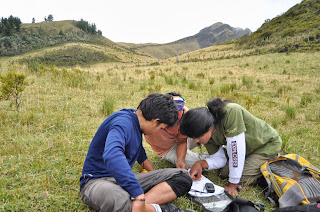Just
one week ago, the fourteen students and three instructors that make up our
semester came together for the first time. Many of us had never met and few
knew the routines here at Kroka Expeditions, but now we have become a
community. We’ve learned to speak openly, appreciate one another, and work
together so that we can accomplish the many tasks we are presented with each
day.
 |
| Before sunrise biking session! |
Every
morning, we rise before dawn and start the day with a bike ride. Willing
ourselves out of our warm sleeping bags and into the cool morning air can be a
struggle, but our bodies are adjusting to this new rhythm. Some days we swim in
Gustin Pond, a few miles east of Kroka. Another morning, we biked to Orchard
Hill, the local bakery up the road where we broke our fast with cookies as a
special treat!
 |
| Robin and Isaiah chopping wood |
After
our morning exercise ritual, we are greeted by the rising sun (most days) and
Kroka staff who help us with chores from 6:30-8:00 AM. Assisting Kroka staff,
we feed the chickens, split and stack wood, gather vegetables, make breakfast,
clean the composting toilets, and work on various projects around the campus.
These experiences give us a new perspective on the farm. The wood we burn is no
longer merely firewood, but trees that have been felled, cut, split and carried
to our fireplace. Our meals are no longer food from mysterious faraway places,
but vegetables from the garden, cheese from the farm across the river, and other
local delicacies.
 |
| Beautiful food and beautiful people! |
Living
here, there is no separation between us and our need for water, food, and
shelter. We are becoming part of the natural cycles that allow us to fulfill
our needs. This morning in our first Permaculture class, we began to explore
how we can learn about the earth and sustainability. Every human being on this
planet depends upon the earth’s bounty, but the modern lifestyle distances us
from the earth so much that we can forget how closely our fate is tied to the
fate of the earth. At Kroka, we are given the unique opportunity to live close
to the land so that we can learn about it in a way that is not just teaching
us information, but teaching us skills and developing a will to act.
Practicality and tangible examples of what we learn in this way are by no means
limited to our Permaculture class.
Our
first class consisted of taking apart bike tires, oiling chains, adjusting
gears, fixing breaks and practicing our agility and balance by biking over
gravel and along thin boardwalks. Joe, a man who runs a business making custom bike frames,
recently moved to Kroka and his expertise in the field has helped us become
confident bike owners. We have become capable of doing basic bike maintenance ourselves. His boundless energy has also
accompanied us on several bike rides, including a two-hour-long trail ride on
crazy back roads on Thursday afternoon. Crashing
down the rocky trails, plowing through rivers and attempting (sometimes
successfully) to jump logs fueled the adrenaline that kept our legs going up
the hills and our spirits high.
 |
| Naya - our musical leader! |
In addition to our three leaders, Marcea, Thomas and Hannah,
we have had several guest teachers this week. Marina, from Brandeis University, came
to test the pond water with us so we could figure out what type of fish could
feasibly live in it. Gathering samples and measuring turbidity in the pond
proved just as difficult as calculating the results of the titration water tests
due to an unruly canoe that managed to flip several times. However, the water
was refreshing and we learned a great deal from Marina. It was a great class,
and we determined that catfish are probably going to be the only option for the
pond due to the water’s softness and low oxygen levels.
We also had the opportunity to learn about lyme disease from
a naturopath from Vermont, knitting from Helen, knot work from Marga, sculpting
from Lacey and Trina, forest ecology from Zack, and the magic of fire from Dan
and Helen. Each of these classes brought us directly into contact with our
studies and brought an interesting new voice into our community.
 |
| Angus sewing his backpack |
However, these classes, along with the Spanish, English and
health/fermentation classes taught by Marcea, Thomas, and Hannah, took no time
at all compared with our big project of the week: backpack making. Lisl Hoffer,
the past semester program director, came Monday through Friday this past
week and helped us make backpacks for our expeditions. The design is relatively
simple, but the amount of time it takes to put everything together is enormous,
especially when the sewing machines tend to stop working rather frequently. We
certainly all had our moments of frustration, but Lisl managed to help us fix
the machines and finish the back-packs in five days! We will reap the rewards of our intense work
by using our back-packs this coming week in our biking expedition.
 |
| Asha practicing slack lining with Tadeo supporting |
As we prepare for the coming expedition, it is exciting to
see how our group has come together, for our potential is limitless and we have
many adventures before us. We’ve only been on semester for seven days, and
already, we’ve learned so much. A week ago, we were strangers, but today, we
are a family. At mealtimes, laughter spills out of the kitchen and our babbling
voices fill the air most everywhere we go.
Until
next time, take care and be well.
Sonya Gluck

























































